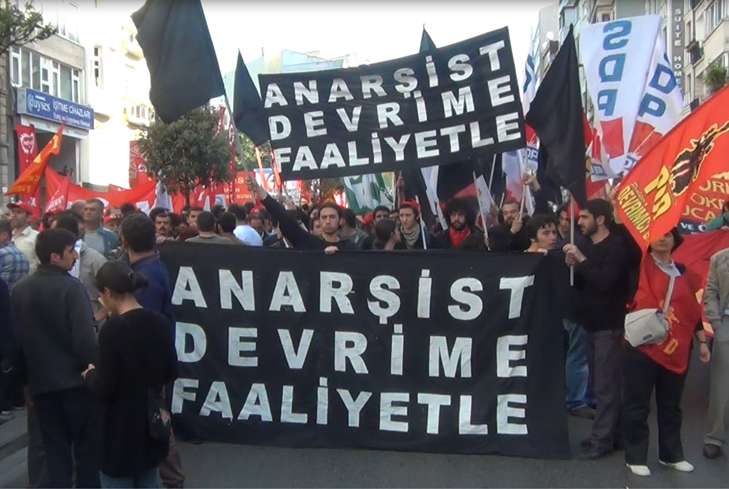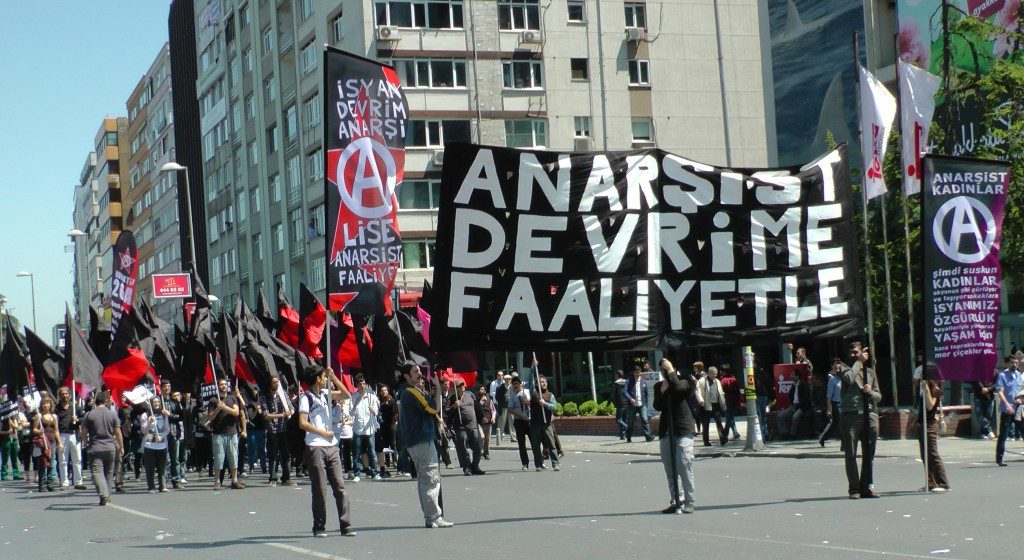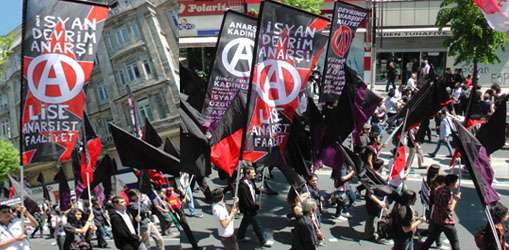In Volume Three of Anarchism: A Documentary History of Libertarian Ideas, I included material by Kurdish anarchists and about anarchist influences on the Kurdish liberation movement. Space considerations prevented me from including material from the anarchist movement within Turkey. Periodically, I have been posting material from the Turkish anarchist movement aboutevents in Turkey and in Kurdish areas where the Kurds are struggling to establish a freer and more just society. Below, I reproduce excerpts from a May 2015 interview with anarchists from the Turkish Devrimci Anarşist Faaliyet (DAF, or Revolutionary Anarchist Action), describing the multi-faceted approach taken by anarchists in Turkey, supporting and participating in workers’ and women’s struggles, the ecology movement, the cooperative movement, the anti-militarist movement, and supporting the Kurdish movement against oppression, whether by the Turkish and Syrian states, or by ISIS. The DAF anarchists interviewed refer to the influence of Errico Malatesta (1853-1932) on their approach. Malatesta’s ideas about the social struggle have been rearticulated by Davide Turcato in his book, Making Sense of Anarchism, which I recently excerpted on this blog.
Building an Anarchist Movement in Turkey
The main issue for DAF is to organize anarchism within society. We try to socialize anarchism with struggle on the streets. This is what we give importance to. For nearly nine years we have been doing this.
On an ideological level we have a holistic perspective. We don’t have a hierarchical perspective on struggles. We think workers’ struggle is important but not more important than the Kurdish struggle or women’s struggles or ecological struggles.
Capitalism tries to divide these struggles. If the enemy is attacking us in a holistic way we have to approach it in a holistic way.
Anarchy has a bad meaning for most people in society. It has a link with terrorism and bombs. We want to legitimize anarchism by linking it to making arguments for struggles against companies and for ecology. Sometimes we try to focus on the links between the state, companies and ecological damages, like the thing that Corporate Watch does.
We like to present anarchy as an organized struggle. We have shown people on the streets the organized approach to anarchism.
From 1989 to 2000 anarchism was about image. About wearing black, piercings and Mohawks. This is what people saw. After 2000, people started to see anarchists who were part of women’s struggles and workers’ struggles.
We are not taking anarchism from Europe as an imitation. Other anarchists have approached anarchism as an imitation of US or European anarchism or as an underground culture. If we want to make anarchism a social movement, it must change.
DAF’s collectives are Anarchist Youth, Anarchist Women, 26A cafe, Patika ecological collective and high school anarchist action (LAF). These self-organizations work together but have their own decision-making processes.
Anarchist Youth makes connections between young workers and university students and their struggles. Anarchist Women focuses on patriarchy and violence toward women. For example, a woman was murdered by a man and set on fire last February. On 25 November there were big protests against violence against women.
LAF criticises education and schooling in itself and tries to socialize this way of thinking in high schools. LAF also looks at ecological and feminist issues, including when young women are murdered by their husbands.
PATIKA ecological collective protests against hydro electric dams in the Black Sea region or Hasankey [where the Ilisu dam is being built]. Sometimes there is fighting to prevent these plants from being built.
26A Café is a self organization focusing on anti-capitalist economy. Cafes were opened in 2009 in Taksim and 2011 in Kadıköy [both in Istanbul]. The cafes are run by volunteers. They are aimed at creating an economic model in the place where oppressed people are living. It’s important to show people concrete examples of an anarchist economy, without bosses or capitalist aims. We talk to people about why we don’t sell the big capitalist brands like Coca Cola. Of course the products we sell have a relation to capitalism but things like Coke are symbols of capitalism. We want to progress away from not-consuming and move towards alternative economies and ways of producing.
Another self organization, PAY-DA – ‘Sharing and solidarity’ – has a building in Kadıköy, which is used for meetings and producing the Meydan newspaper. PAY-DA gives meals to people three times a day. It’s open to anarchists and comrades. The aim of PAY-DA is to become a cooperative, open to everybody. We try to create a bond which also involves the producers in the villages. We aim to have links with these producers and show them another economic model. We try to evolve these economic relations away from money relations. The producers are suffering from the capitalist economy. We are in the first steps of this cooperative and we are looking for producers to work with.
All of these projects are related to DAF’s ideology. This model has a connection with Malatesta’s binary model of organization.
These are anarchist organizations but sometimes people who aren’t anarchists join these struggles because they know ecological or women’s struggles, and then at the end they will learn about anarchism. It’s an evolving process.
As DAF we are trying to organize our lives. This is the only way that we can touch the people who are oppressed by capitalism.
There is also the Conscientious Objectors’ Association, which is organized with other groups, not just anarchists. Our involvement in this has a relation with our perspective on Kurdistan. We organize anti-militarist action in Turkey outside of military bases on 15 May, conscientious objector’s day. In Turkey the military is related to state culture. If you don’t do your military duty, you won’t find a job and it’s difficult to find someone to marry because they ask if you’ve been to the army. If you have been to the army, you’re a ‘man’. People see the state as the ‘Fatherland’. On your CV they ask whether you did military service. ‘Every Turk is born a soldier’ is a popular slogan in Turkey.
via robertgraham.wordpress.com
Published OCTOBER 4, 2015



